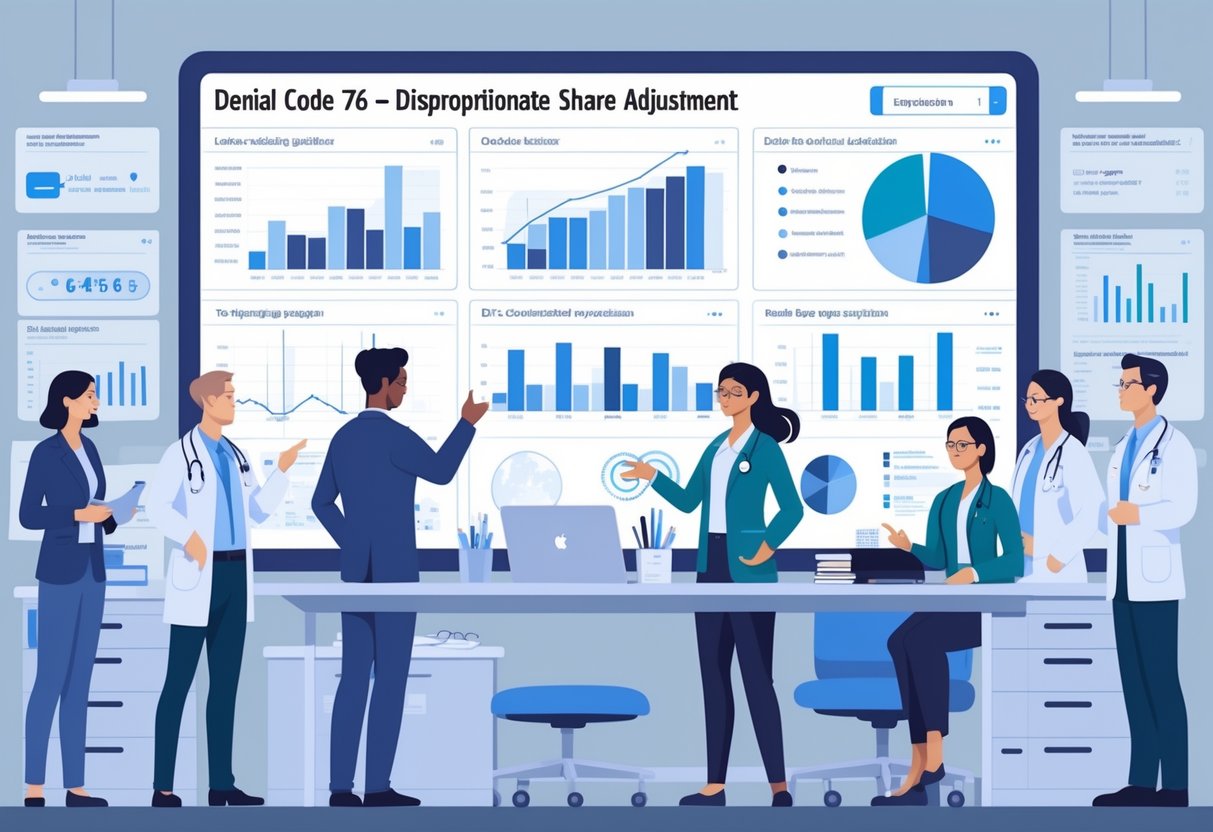Denial code 76 – Disproportionate Share Adjustment means your claim was denied because the payment involves adjustments related to hospitals serving a large number of low-income patients. This denial happens when the insurer applies rules tied to how much extra funding hospitals get for caring for certain populations, affecting your claim payment.
Understanding this denial code helps you identify if your claim was reduced due to these specific payment rules. It also guides you on what steps to take next if you believe the denial was incorrect or if more information needs to be provided.
Knowing why denial code 76 appears can save you time and avoid confusion when dealing with claim rejections. It focuses directly on the impact of government adjustments on your billing and reimbursement process.
Understanding Denial Code 76 – Disproportionate Share Adjustment

Denial Code 76 relates to adjustments made when billing for services under the Disproportionate Share Hospital (DSH) program. It often involves specific rules about patient eligibility and facility status. Knowing these details will help you avoid claim denials.
Definition and Purpose
Denial Code 76 is used to signal an issue with a Disproportionate Share Adjustment (DSH). This adjustment is part of Medicare’s system to help hospitals that serve many low-income or uninsured patients. The code shows that a claim may have been adjusted or denied because it does not meet DSH criteria.
The main purpose is to control payments and ensure funds go only to eligible hospitals. If your billing doesn’t match the rules for DSH, this denial code may appear. Understanding how DSH works will help you manage these denials better.
Applicability in Medical Billing
DSH applies mostly to hospitals classified as disproportionate share hospitals based on the volume of low-income patients they treat. When you bill Medicare or Medicaid, claims from these hospitals might be adjusted with Code 76.
This code appears if the hospital’s patient mix does not qualify for the DSH adjustment or if improper documentation accompanies the claim. You should verify patient eligibility and hospital status before submitting claims to reduce the chance of denial.
Related Billing Codes
You might encounter related codes alongside Denial Code 76, such as:
| Code | Description |
|---|---|
| 77 | Payment reduced due to DSH limit reached |
| 78 | DSH payment adjustment applied incorrectly |
These codes help clarify why a payment was cut or denied related to the DSH program. Keep these in mind when you see Denial Code 76 on your claim, as they may guide your next steps for correction or appeal.
Common Causes of Denial Code 76

Denial Code 76 often happens due to problems with hospital status, paperwork mistakes, or issues with patient eligibility. These areas can lead to claim denials if they are not handled carefully.
Incorrect Disproportionate Share Hospital Status
You may face denial if your hospital’s Disproportionate Share Hospital (DSH) status is not reported correctly. This status determines whether your hospital qualifies for additional payments based on the number of low-income patients served.
If your status is outdated or incorrect, payers will deny your claims under code 76. To avoid this, ensure your hospital’s DSH certification is current. Regularly review your eligibility and update records with Medicaid or Medicare as needed.
Documentation Errors
Claims can be denied if the documentation supporting your disproportionate share adjustment is incomplete or inaccurate.
You must provide clear proof of the hospital’s patient volume and payer mix. Missing patient records or incorrect data can trigger denial code 76.
Keep thorough, organized records and double-check all forms before submitting claims. This reduces errors and speeds up payment processing.
Eligibility and Compliance Issues
Denial can also occur if your hospital or patients do not meet specific eligibility rules for the disproportionate share adjustment.
Ensure your hospital complies with all federal and state guidelines. If your hospital does not meet the minimum low-income patient thresholds, your claims may be denied.
You should also verify patient eligibility carefully before billing. Incorrect patient classification related to income or insurance status can lead to compliance issues and denial under code 76.
Impact on Reimbursement and Revenue Cycle
Denial code 76 affects how much you get paid and how smoothly your billing process works. It creates financial challenges and influences how hospitals manage their budgets related to care for low-income patients.
Financial Implications for Providers
When you receive denial code 76, payments tied to the Disproportionate Share Adjustment (DSH) may be reduced or delayed. This can lower your expected revenue for serving a large number of Medicaid or uninsured patients.
You might face increased administrative work to appeal denials or correct claims. This impacts your revenue cycle by creating cash flow delays and higher billing costs.
Tracking these denials closely helps you identify patterns and improve claim accuracy. Efficient management reduces payment losses and supports financial stability in your practice.
Effects on Hospital Funding
Hospitals rely on DSH payments to offset costs of caring for low-income and uninsured patients. Denial code 76 lowers these payments, placing pressure on hospital budgets.
This can lead hospitals to cut costs or reduce services for vulnerable populations. You may see an increase in uncompensated care burdens.
Proper documentation and compliance with DSH program rules are essential. Ensuring eligibility and claim correctness can help maintain this important funding source.
Strategies to Prevent Denial Code 76
To avoid Denial Code 76, focus on precise patient and hospital classification, thorough documentation, and regular staff training. These steps help ensure proper billing and reduce errors related to disproportionate share adjustments.
Accurate Patient and Hospital Classification
You need to classify patients and hospitals correctly to prevent errors that lead to Denial Code 76. Verify patient eligibility and status carefully before submitting claims. Use standardized codes and confirm that hospital types match payer requirements for disproportionate share adjustments.
Double-check patient income levels, insurance coverage, and service eligibility. Apply the correct classification guidelines consistently to avoid misclassification. Accurate classification affects payment adjustments, so take your time to confirm details with each patient record.
Comprehensive Documentation Practices
Your documentation must clearly support every claim related to disproportionate share adjustments. Keep detailed records of patient financial status and hospital service details. Proper documentation shows why adjustments apply and defends your claim against denials.
Use checklists or templates to capture all necessary data. Include income verification, eligibility proofs, and hospital service codes. Well-organized, complete files reduce confusion and speed up claim approval processes. Review documents for accuracy before sending claims to payers.
Ongoing Staff Training
Regular staff training is essential to maintain compliance with billing rules tied to Denial Code 76. Train your billing, coding, and front-office teams on current policies and documentation standards. This keeps everyone updated on best practices.
Use workshops, webinars, or refresher courses to reinforce skills. Focus training on accurate classification, proper documentation, and new payer guidelines. Consistent education lowers errors and improves your ability to handle complex claims successfully.
Steps for Appealing Denial Code 76 Adjustments
To appeal Denial Code 76, you will need specific documents, meet deadlines, and follow a clear process. Staying organized and timely is crucial. You must also know how to track and respond after submitting your appeal.
Required Appeal Documentation
You need to gather key documents when appealing Denial Code 76. This includes:
- The original claim and denial notice.
- Detailed patient records showing eligibility for Disproportionate Share Adjustment.
- Proof of compliance with Medicaid or Medicare criteria.
- Financial reports supporting the claim adjustment.
Make sure all documents are accurate and complete. Incomplete or incorrect documents can cause further denial or delay.
Timeline and Submission Process
You usually have 30 to 60 days to file your appeal after receiving the denial. Check the exact deadline in your denial letter.
Submit your appeal through the official portal or by mail, as specified in your notice. Keep copies of everything you send.
Use tracked mailing methods or confirmation receipts when submitting, to verify your appeal reached the correct department.
Follow-Up Best Practices
After submission, monitor the status of your appeal regularly. Use online portals or phone inquiries to check progress.
Document all communications, including dates, names, and summaries of calls or emails.
Respond promptly to any requests for additional information. Timely replies help avoid further delays.
If your appeal is denied again, review the reasons carefully to decide if you want to escalate or submit a new claim.
Frequently Asked Questions
Denial Code 76 affects how hospitals receive payments when claims involve the Disproportionate Share Adjustment. Understanding the reasons for denial, required documentation, and appeal steps will help you handle these claims properly.
What is the impact of Denial Code 76 on hospital reimbursement processes?
Denial Code 76 reduces or denies payment for claims tied to the Disproportionate Share Adjustment. This can delay reimbursement and affect cash flow for hospitals serving many low-income patients.
How can one efficiently resolve a Denial Code 76 notice received on a claim?
You should review the claim for completeness and accuracy. Check if the hospital meets DSH criteria, then submit corrected claims or required documents to the payer promptly.
What are the criteria for a hospital to be subjected to the Disproportionate Share Adjustment?
Hospitals qualify if they treat a high percentage of low-income or uninsured patients. Specific thresholds are set by Medicare and related programs, based on patient mix and uncompensated care.
Are there specific documentation requirements for avoiding Denial Code 76?
Yes. You must provide detailed patient income information and proof of uninsured or low-income status. Accurate coding and verification of eligibility are also necessary.
What steps should be taken when a claim is rejected due to Denial Code 76?
First, gather all relevant documentation showing DSH eligibility. Contact the payer to understand the exact reason for denial. Then correct and resubmit the claim with the needed evidence.
Can Denial Code 76 be disputed, and what is the process for such an appeal?
You can dispute Denial Code 76 by filing a formal appeal. Include supporting documents that prove compliance with DSH rules. Follow the payer’s guidelines for appeal submission and deadlines.







